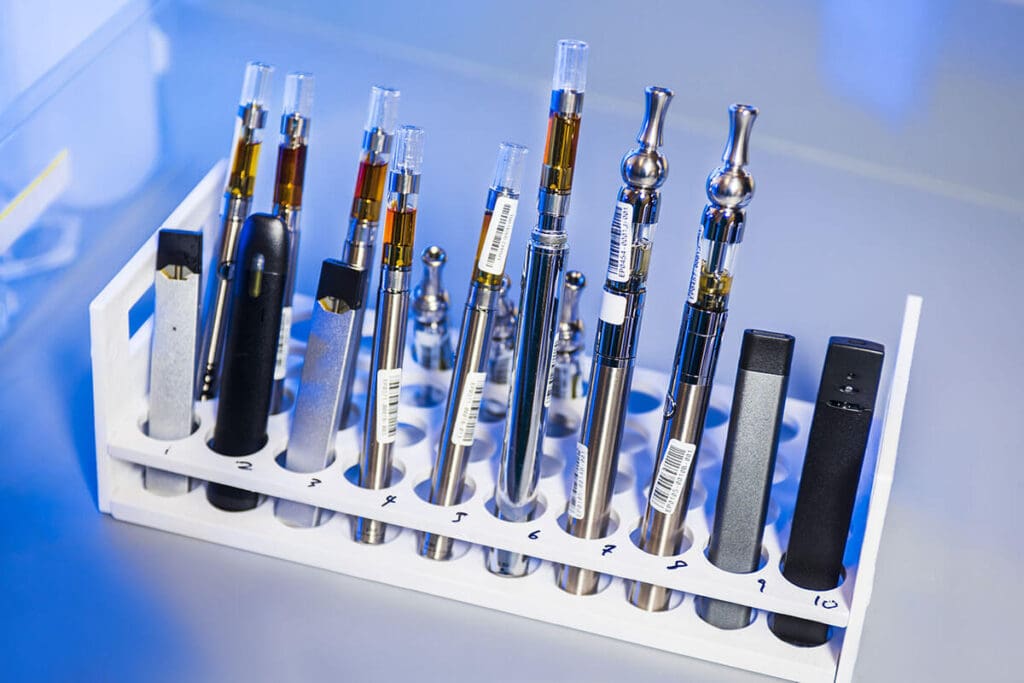
If we are to make a generational impact on cancer, we know we have to be bold. Part of our plan to clear the path for a cancer free future is tackling vaping and tobacco use.
We are leading the way with policy-relevant research into e-cigarette use (vaping) among young people and advocating to governments to deliver much needed policy change.
Tobacco remains the leading cause of preventable death in our community, with smoking causing at least 16 types of cancer and 20% of cancer deaths in NSW.
While tobacco use has declined in Australia over recent decades, the rise of vaping among young people risks undermining our progress. Nicotine can be found in both tobacco and e-cigarettes, which is highly addictive. And young people who vape are around three times as likely to take up smoking than those who don’t vape.
Read on to learn more about what we achieved in 2023.
A national vaping advocacy win driven by our research
In 2023, our Generation Vape research project* culminated in an incredible advocacy win: The Australian federal government announced decisive action on vaping, with new policies to safeguard our tobacco control success and stop a new generation from becoming addicted to nicotine.
The new policies include stopping the importation of non-prescription e-cigarettes at our borders, banning single-use vapes, introducing pharmaceutical-like packaging and reducing allowable nicotine contents. The importation ban on single-use vapes will come into effect on 1 January 2024 with further changes to follow from 1 March 2024.
Our Generation Vape research heavily influenced the federal government’s new policies, as it provided critical evidence on access, use, knowledge and behaviours surrounding vaping.
For example, our research showed that the use of e-cigarettes has dramatically increased in recent years, with a growing number of young people experiencing side effects such as nicotine addiction, poisoning and lung injury.
We’ve also found that 90% of people aged 14-17 find it “easy” to access e-cigarettes and 58% of them have used vapes they knew contained nicotine. Among 18 to 24-year-olds we surveyed, 37% use vapes and 80% of them buy e-cigarettes from retail stores.

Welcoming the new National Tobacco Strategy
In May 2023, we also welcomed the federal government’s new National Tobacco Strategy (2023-2030), which plots a new path to reduce smoking in Australia to below 10% by 2025 and below 5% by 2030.
This new strategy reflects the hard work across research, policy and advocacy from across Cancer Councils over many years.
As Alecia Brooks, the manager of Cancer Council NSW’s Tobacco Control Unit and Chair of Cancer Council’s Tobacco Issues Committee, explains, “this new strategy builds on momentum to ensure these declines are experienced equitably by all Australians”.

Campaigning for decisive NSW government action
Today, our committed volunteers and staff continue to engage the NSW government to ensure support for the new national reforms.
Anita Dessaix, Cancer Council NSW’s Director of Cancer Prevention and Advocacy, a co-author of Generation Vape and chair of Cancer Council’s Public Health Committee explains why government action on vaping is so important: “Unless all governments, federal, state and territory, urgently crack down on the illegal importation and retail and wholesale sale of e-cigarettes and their widespread illegal use in young adults, teenage vaping will go from emergency to crisis”.
You can join the movement and take action on e-cigarettes here.
Helping young people quit vaping
In 2022/23, Cancer Council NSW were grateful to receive a generous grant of $950,000 from nib foundation to scope, pilot, develop and evaluate a new online tool to help young people aged 14-24 quit vaping in Australia.
Our new online tool will fill a gap in the market, as there are currently no specific vaping cessation support services tailored to young people in Australia.
Our new online tool will fill a gap in the market, as there are currently no vaping cessation support services tailored to young people in Australia.
To ensure that young people get the support they need, we will co-design the tool with its intended users. Informed by the success of existing smoking cessation programs, we envision a text message-based service with online support for young people as well as for parents, teachers, carers and health professionals.
Our thanks to nib foundation for their continued support of Cancer Council NSW’s prevention priorities, and for their generous funding of this project.








